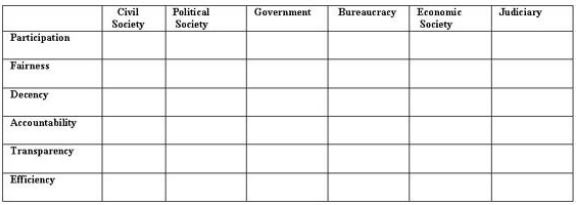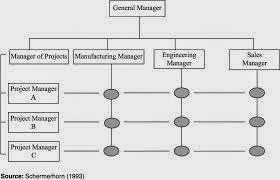Good Governance: Framework, Issues, Working Plan and Strategies of Nepal
1.
Introduction
Governance is the
government’s ability to make and enforce rules. It is also to deliver services
regardless of whether that government is democratic or not. If it is conceptualized
simply then it is the process of decision-making and the process by which
decisions are implemented or not. It also can be in different forms, such as-
corporate governance, international governance, national governance, local
governance, new public management governance (NPM), and others. However, there
is a difference between governance and good governance. Not every government is
counted as a good government because of the actions they make. Governance is
the exercise of political power to manage a nation’s affairs, where good
governance also involves an efficient public service and legal framework to
enforce contracts. According to Rhodes, there are some shared characteristics
of governance.
· Interdependence
between organizations. Governance is more than government, covering non-state
actors and changing the boundaries between public and private.
· Continuing
interactions between network members, caused by the need to exchange resources
and negotiate shared purposes.
· Interactions rooted
in trust and regulated by rules.
2.
A Framework for Assessing Governance
Governance has emerged as
one of the main themes of international development. If governance matters, so
does the need to assess key aspects in a systematic matter. However, given the
many political and technical challenges, governance assessments need to be
operationalized in careful ways.
Based on reviews of the
extensive literature, our work clusters the rules that seem to matter into six
main arenas of governance activity:
·
Civil Society - rules affecting the way
citizens become aware of and raise issues in the public
·
Political Society - rules shaping the way
issues are combined into policy by political institutions
·
Government - rules affecting the way
policies are made by government agencies
·
Bureaucracy - rules determining the
administration and implementation of policies
·
Economic Society - rules regarding
state-market interactions
·
Judiciary - rules defining the resolution
of disputes and conflicts
It also outlines six
principles for assessing governance. The first three are particularly relevant
to the way state actors relate to citizens, while the last three are more
specific to the operations of the state itself.
·
Participation - the degree to which
affected stakeholders are able to sense ownership and involvement in the
political process
·
Fairness - the degree to which rules are
applied equally to everyone in society
·
Decency - the extent to which rules are
handled without humiliating or harming people
·
Accountability - the extent to which political
actors are perceived as responsible to the public for what they say and do
·
Transparency - the degree to which rules
about openness and clarity are upheld in the public realm
·
Efficiency - the extent to which rules
enhance effective use of scarce resources without incurring waste or delay
These principles are
universal in the sense that they are respected in different societies all over
the world (even though, they may at times contradict each other in practice).
The WGA initiative puts forward a framework for assessing governance that
focuses on these six principles and six arenas. They provide a comprehensive
overview of the full task and disaggregate it at the same time into manageable
units that can be treated independently but also in common with the others.
Governance Model : The WGA Framework for Assessing Governance
'
Source: World Governance Survey
3.
Government to Governance
If government is about
the arbitration of how scarce societal resources are allocated, governance is
about the contestations around how resources are actually allocated. Kooiman
(2003:4) distinguishes between “governing” as “the totality of interactions, in
which public and private actors participate, aimed at solving societal problems
or creating societal opportunities” and governance as “the totality of
theoretical conceptions of governing”. Thus governing may be defined as the
process through which the contestations and interactions among the competing
actors are settled. Under the umbrella of governance there have been numerous
discussions since the early 1980s among policy makers and social scientists
alike on collaboration, cooperation, and coordination on the account of
increased interdependencies among actors in markets, networks, and hierarchies.
The discussions on the changing mode of governance may be grouped into two main
camps. First, there are those who view the emphasis on collaboration,
cooperation, private-public partnerships, and so forth as a product of an
ideological shift toward neo-liberalism and a move away from the conception of
the state as the provider of welfare and the convener responsible for social
cohesion. Second, there is a view that the informalization of formal state
functions signifies a move toward a mode of "cogovernance" wherein
actors in civil society are able to engage more in matters of public policy
than they did during the period immediately following the Second World War
until the early 1980s. The first camp views the change in governance
characteristics as a move toward less democracy while the second camp sees at
least a potential for increased democracy and civil engagement in matters of
policy and social development.
Table 1: Common and
Significant features in Definitions of "Governance"
In the policy making
domain governance is often described as the exercise of authority and control
by a multiplicity of private and public interests. This view of governance
seems prevalent in most official definitions of the term. For example, a
cursory look at the more formal definitions of governance yields a series of
key words (Table 1) that point to governance as how actors organize themselves.
The European Commission
uses the term “Good Governance” to refer to a system of governing whose
intentions are consistent with the common good of the Member States and the
European Community as a whole. The Commission’s vision is based on the five
political principles of openness, participation, accountability, effectiveness,
and coherence. Furthermore, these principles are to be maintained through the
“institutions” of the European Union’s governance system (Table 2)
Table 2: European
Commission's Principles of "Good Governance"
What is most striking in
the Commission’s definition of good governance is the emphasis on the role of
institutions as entities that are largely viewed as being “up there” and, at
least currently, insufficiently within the reach of ordinary citizens. As such,
this view of governance seems concerned primarily with minimizing
bureaucratization and hierarchy. Thus the intent of the White Paper on European
Governance (CEC 2001) is to make these formal institutions – which are
increasing in size and number – more accessible, accountable, and relevant to
the general populace and to retain a higher degree of relevancy, credibility,
and legitimacy in the average person’s mind. The White Paper’s necessary but
exclusive focus on formal institutions overlooks the important role played by
other, less formal, institutions in European governance, particularly in policy
formation and implementation.
Table 3: Common and
Significant Features in Definitions of Good Governance
There are other
definitions of good, or democratic, governance that implicitly point to the
importance of informal institutions. Table 3 highlights the keywords and
summarizes some of the key characteristics of such definitions of good
governance. An illustrative example is provided by the UNDP, which defines
governance as “the exercise of economic, political and administrative authority
to manage a country's affairs at all levels. It comprises the mechanisms,
processes and institutions through which citizens and groups articulate their
interests, exercise their legal rights, meet their obligations and mediate
their differences”. Other international organizations, e.g., the World Bank,
USAID, offer similar definitions of governance for the common good.
4.
Issues, Working Plan, Program and Strategies of Nepal - Good Governance
It
has been proved from the national and international experiences that the
multidimensional development can be moved forward in the state when people can
be guaranteed for good governance by making public service delivery effective,
increasing transparency, participation, accountability, predictability and
legitimacy in the operation of state management and development affairs.
Therefore, it is necessary to make service delivery effective by making
necessary reforms in the administrative areas and guaranteeing the people for
good governance. In this context, the efforts have been continued to translate
the basic principles and assumptions of good governance in practice through the
formulation and implementation of laws (legislations) including Good Governance
(Management and Operation) Act, 2007, Civil Service Act, 1993, Local
Self-Governance Act, 1998, Corruption Alleviation Act, 1992, Public Procurement
Act, 2007 and Right to Information Act 2007.
The
emphasis on good governance is expected to produce result-oriented and
effective management of service delivery and implementation of projects /
Programmes thereby correcting the weaknesses in practical field. For the
enhancement of good governance, participatory economic development is stressed
to strengthen monitoring and evaluation system, to make decision making
procedure and public expenditure pattern more responsible and transparent, to
implement effectively decentralization at local level and to enforce
administrative mechanism to be efficient, capable, responsible and effective.
The working capacity and reliability of local bodies will be enhanced to
mobilize local resources through decentralization. Transparent bases of
projects selection, prioritization and transparency in their implementation
will be followed strictly to upgrade effective implementation of development
Programmes. Priority will be given on the utilization of new technology,
productivity and enhancement of work efficiency and population management to
implement above mentioned four strategies effectively and to make their
cumulative effects positive and high to achieve the target of the plan. Participatory
development process will be encouraged by managing active participation of
private sectors, non-government sector and civil society along with public
sectors and local agencies to reduce poverty through socio-economic
transformation of rural areas.
4.1.
Issues of Governance
·
Lack of effective implementation of the
legal provisions related to the operation of public services
·
Lack of measurable standards for the
objective evaluation of the employee's performance
·
Lack of transparency in decision making
process, centralized decision making system, ambiguity in the allocation of
responsibilities
·
Lack of effective mechanism to discourage
the irregularities and the interference of non-administrative sector in
administrative sector etc. are the problems prevailing in the field of good
governance
4.2.
Policy and work plan
·
Interact and co-work with various
stakeholders and civil societies in order to make the political and high
managerial leadership aware of and committed to the reform process.
·
Initiate the process of improving
performances of certain ministries; in addition, involve civil society in the
performance evaluation of agencies that deliver public services.
·
Prepare an individual civic charter of
each administrative units working at the central and at the local level.
·
Encourage non-governmental organizations,
community organizations and institutions, users' groups and the private sector
in delivering services and materials to the people.
·
Turn over the tasks performed by the
central level agencies to the local bodies as many as possible. Adopt the
policy on contracting out non-core services.
·
Set the service standard of and the annual
performance improvement plan of the agencies that directly deliver services to
the people.
·
Adopt the policy on promoting transparency in
and responsibility for the performances of the government agencies.
·
Adopt the further effective policy on
recruiting and promoting civil servants based on their merits in order to make
the civil service effective, in addition to making training job-oriented.
Implement a transparent policy on the transfer of civil servants for making the
civil servant transfer system effective.
·
Adopt the policy on implementing an
Affirmative Action Plan for increasing the women's participation in the civil
service.
·
Make improvement in the technique of
examinations given to recruits for increasing the job efficiency of Public
Service Commission.
·
Prepare a long-term policy on the salary
of civil servants making structural changes in it.
·
Adopt the policy on proper sizing of the
civil service reviewing the number of civil servants required and cutting off
the unproductive staff positions for making the civil service clean and prompt
·
For the total system of good governance,
legal provisions will be developed against currency laundering, and
anti-corruption strategy will be formed. The institutions like Commission for
Investigation of Abuse of Authorities and National Alertness Centre will be
strengthened.
·
Strengthen the monitoring and evaluation
system for monitoring and evaluating the implementation of policies, programs
and projects to complete them at the estimated cost and time, and to achieving
the anticipated results in quantity and in appropriate quality.
·
Link the human right program with the
national development program based on the available resources for implementing
the commitments made to human rights in various international forums, and for
effectively protecting and promoting human rights mentioned in various
international conventions and ratified by Nepal, and fundamental rights
provided by the Constitution of Nepal of 2047 (1990).
·
Place emphasis on development of necessary
basic services, institutional aspect and manpower for making the quality jobs
of preparing new human rights laws and refining the prevailing human rights
laws, and for making these laws pursuant to the international standard.
·
Develop physical infrastructures and
institutional capacity of law courts, and develop manpower required for them.
4.3.
Good Governance Program
a) Develop
ability and leadership of the reform process
b) Increase
the financial efficiency of civil administration
c) Enhance
efficiency and motivate civil servants
d) Honesty,
corruption control and transparency
e) Improve
job performances of government agencies
4.4.
Strategies for Good Governance
·
Prepare the
foundation for necessary legal and institutional reform by clearly defining the
relation between political sector and administrative sector and by making the administrative
processes and functions fair, easy, lean, transparent, participative and
clearly predictable and create the environment for people to perceive good
governance.
·
Apply the
processes of electronic governance system in the administrative works of the
agencies by setting the long-term objective of making paperless government.
·
Strengthen and
reform corruption control related legal system and administrative structure
congruous to the commitment made by international community through the
international convention against corruption.
·
Make public
service delivery fair, transparent and effective ensuring the environment to
receive qualitative public services fairly, compatibly, legally and timely by
the targeted groups.
·
Make the public
service inclusive making the provision of providing equal opportunities for
service entry to the eligible and interested individuals of all classes and
communities.
·
Devolve/delegate
the administrative authority to the agencies closest to the common people for
such sorts of functions for which they are capable.
·
Develop
administrative capacity to make the public policy formulation, implementation
and evaluation process effective.
·
Make the
monitoring and evaluation process of administrative and development functions
effective.
·
Make the
implementation of the performance-based employee reward and punishment policy
effective making the employee's performance evaluation objective.
·
Make necessary
reform on the various aspects of human resource management including the
employees' appointment placement, transfer, promotion and determination of
compensation predictable so that they could be made predictable legal and
congruent to the fundamental norms of motivation.
·
Regulate, monitor and enhance the capacity of
private, co-operatives nongovernment and civil society organizations, involved
in the functions of quality determination, production and distribution of
public services and commodities.
Concluding Remarks
and Way Forward
Recent
economic and social developments have increased attention given to the role
that good governance plays in achieving social and economic development.
· Public
management reforms have been a key factor in improving capacities of OECD
countries to address issues such as budget deficits; external pressures on
competitiveness, not least as a result of growing globalization; perceived lack
of public confidence in government; growing needs for services; and increasing
demands for better and more responsive services.
· There
is also a growing recognition that the current world financial crisis stems
from weaknesses in the institutions of governance, and that durable solutions
to this crisis need to address these governance problems.
Systems of
governance affect the performance of the state in executing its core functions
and through this, the performance of countries in meeting their major economic
and social goals.
· Governments
create the conditions for functioning of markets, operation of private firms,
strength of civil society, and welfare of communities and individuals.
· The
quality of governance is recognized as fundamental to ensuring the quality of
life of citizens.
· In
its own right, good governance is important as a determinant of the
sustainability and strength of democracies.






Comments